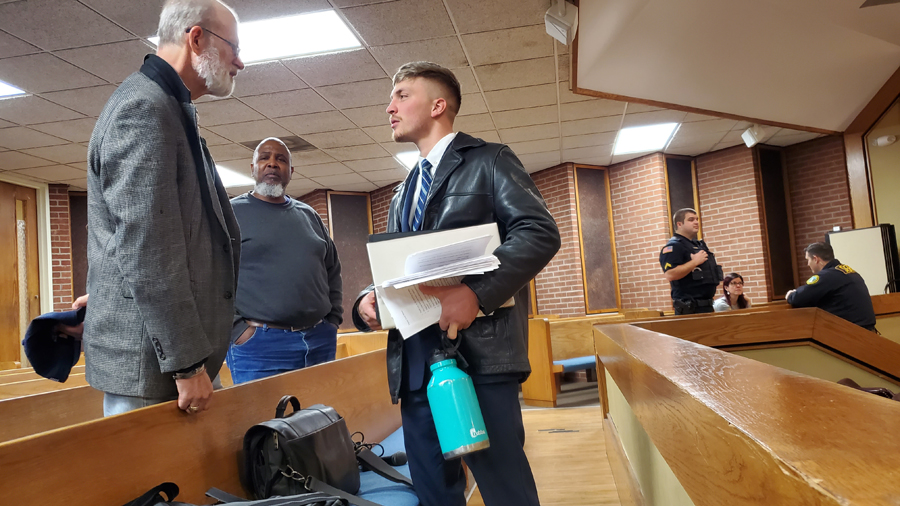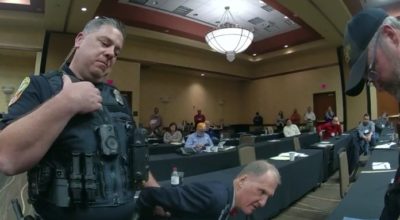
Preston Settle cites in his pre-trial filings an important right to travel case called Aptheker et al v. Secretary of state, 378 U.S. 500 (1964). (Photo David Tulis)
CHATTANOOGA, Tenn., Monday, Jan. 22, 2024 — The more I look at the right of ingress-egress from one’s house, the more I study the so-called “right to travel,” the more I am convinced that if free people defeat the abuse of “traffic stops” we will have made progress in restoring our rights as free Americans.
By David Tulis / NoogaRadio Network
Preston Settle of Sevier County, Tenn., northeast of Knoxville, faces a circuit court judge, Rex Ogle, Feb. 6 in which the judge expects him to show proof of having a driver license, registration of his car and “proof of insurance.” He is being coerced into these proofs of commerce to avoid arrest under a capias threatened because he showed up late for a trial by jury on Jan. 11.
Mr. Settle is defending the right of free movement by car, the right to NOT be in commerce, as the judge is demanding. These rights are upheld in many places, including in the case Aptheker et al v. Secretary of state, 378 U.S. 500 (1964):
We noted in Kent v. Dulles, 357 U. S. 116, 126, that “freedom of movement,” both internally and abroad, is “deeply engrained” in our history. I would not suppose that a Communist, any more than an indigent, could be barred from traveling interstate. I think that a Communist, the same as anyone else, has this right. Being a Communist certainly is not a crime; and while traveling may increase the likelihood of illegal events happening, so does being alive. If, as I think, the right to move freely from State to State is a privilege and immunity of national citizenship (seeEdwards v. California, 314 U. S. 160, 178), none can be barred from exercising it, though anyone who uses it as an occasion to commit a crime can of course be punished. But the right remains sacrosanct, only illegal conduct being punishable.
Free movement by the citizen is of course as dangerous to a tyrant as free expression of ideas or the right of assembly and it is therefore controlled in most countries in the interests of security. That is why riding boxcars carries extreme penalties in Communist lands. That is why the ticketing of people and the use of identification papers are routine matters under totalitarian regimes, yet abhorrent in the United States.
Freedom of movement, at home and abroad, is important for job and business opportunities—for cultural, political, and social activities—for all the commingling which gregarious man enjoys. Those with the right of free movement use it at times for mischievous purposes. But that is true of many liberties we enjoy. We nevertheless place our faith in them, and against restraint, knowing that the risk of abusing liberty so as to give rise to punishable conduct is part of the price we pay for this free society.
Freedom of movement is kin to the right of assembly and to the right of association. These rights may not be abridged, De Jonge v. Oregon, 299 U. S. 353; NAACP v. Alabama, 357 U. S. 449, 460-462, only illegal conduct being within the purview of crime in the constitutional sense.
War may be the occasion for serious curtailment of liberty. Absent war, I see no way to keep a citizen from traveling within or without the country, unless there is power to detain him. Ex parte Endo, 323 U. S. 283. And no authority to detain exists except under extreme conditions, e. g.,unless he has been convicted of a crime or unless there is probable cause for issuing a warrant of arrest by standards of the Fourth Amendment.
This freedom of movement is the very essence of our free society, setting us apart. Like the right of assembly and the right of association, it often makes all other rights meaningful— knowing, studying, arguing, exploring, conversing, observing and even thinking. Once the right to travel is curtailed, all other rights suffer, just as when curfew or home detention is placed on a person.

